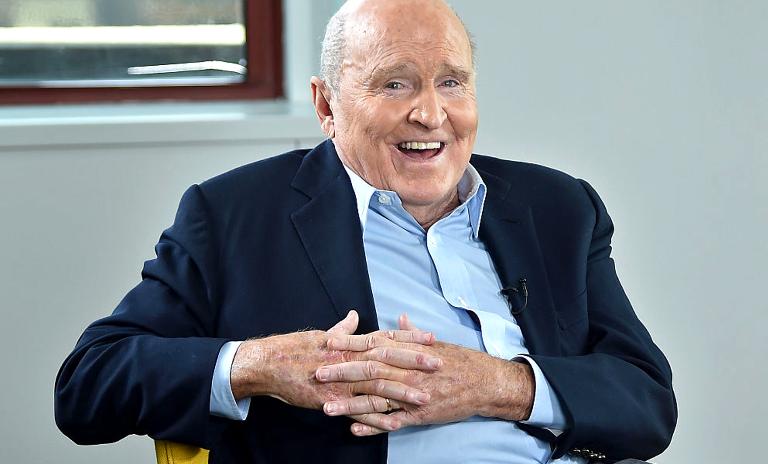" You must treat employees with dignity at every level of the organization and you must work to give them voice. Getting every mind in the game is a critical skill level. "


GE’s legendary CEO Jack Welch on people management in our Think:Act Magazine in 2013

Think:Act Magazine
Our interview with the American businessman who expanded General Electric to become world’s biggest company
During his tenure at General Electric, the company’s value rose 4,000 percent. Former GE CEO Jack Welch, one of the most admired and controversial managers of his generation, spoke with Think:Act Magazine in 2013 about leadership and the American and European economies.

"The idea that business is softer today than it was 25 years ago is silly and foolish. […] An open culture where debating issues is part of a winning culture. Being soft doesn’t get you to the right answer."
THINK:ACT: Mr. Welch, you retired in 2001 as CEO of GE. Are younger CEOs different from those of your generation?
Jack Welch: The universals are that a CEO has to be able to define a vision, get that vision transmitted to the organization in real, vibrant, live tones. A CEO has to have a set of values and behaviors. The vision tells you where you are going. The values and behaviors tell you how you are going to get there. He has to be able to get the organization to buy into these behaviors and understand them. Candor is ever more important. It was important then. Some didn’t have it. Candor has to be part of an organization’s soul. People management. That’s universal. You have to hire great people. You have to have appraisal systems for people to reach their full potential. These themes transcend decades and generations.
When it comes to “people management,” do you still believe in and teach your students the 20-70-10 rule of ranking workers in good, average, and poor categories and getting rid of the bottom 10 percent every year? Does this method work for all organizations?
Jack Welch: It doesn’t have to be 20-70-10. Your best players, average players, and worst players are what they are. You have to deal with it. It’s the same on baseball, soccer, and football teams.
Is this notion the same as the idea of “rank and yank?” That’s what many people started calling it.
Jack Welch: No! Rank and yank implies firing. That’s not what I was about. Rather, you communicate with your people (who are the bottom 10 percent). You tell them what is expected. You tell them what to fix. You give them a chance to improve. You give them plenty of runway... You must treat employees with dignity at every level of the organization and you must work to give them voice. Getting every mind in the game is a critical skill level. Always be there. You’ve got to encourage it. Feed it. You are always raising the intellectual bar. That’s never going to change.
Certainly, some of these tasks must have changed in the past decade. As you evaluate companies for private equity firms, what do you see is primarily different today for business leaders?
Jack Welch: Speed. Everything is faster. World changes are faster. Currency changes are faster. All these things are quicker. That’s accentuated by the slower growth environment. Everyone is focused on innovation. What does innovation do? It shortens the life cycle between products. Products are coming on faster and faster. So speed in decision making is also much faster. You have to operate at a quicker pace. Information is accelerating that. Information makes the world transparent. Let’s take social media. That changes the relationship between you and your employees, you and your customers. You cannot have a bad service issue and sit there. It will be on social media rapidly and your reputation can be stained for months, or years. You have to be able to respond to errors quickly. Your employees do have voice... Everybody sees everything about you. That means you have to be trigger fast. You have to have excellent service and ability to respond to customer complaints.
And with that use of social media on the rise, what should hiring managers be thinking about in an age of LinkedIn, Twitter, Facebook, online resumes, and other digital mechanisms?
Jack Welch: Your reputation’s out there. You can find people much easier. You still need a lot of the screening mechanisms you always had before you started getting avalanched with people. You still can get all the bodies you wanted but you’re able to screen more people faster, quicker, and more easily.
It seems a trend in management today has to do with executives understanding the millennial generation, acting more collegial, and being less “boss-like” than CEOs in years past. What do you think of the idea that managers today are supposed to be nice? Are leaders today too concerned with being likable, particularly in a more diverse workplace?
Jack Welch: Everybody has to gain the respect of their organizations. Everyone has to demonstrate human decency. That hasn’t changed. The idea that you’ve got more minorities, broader gender? That just means you have to treat people well no matter who they are. You can’t be a jerk with men, women, or anybody.
But some leaders at companies like Whole Foods and Zappos are writing books, suggesting a new focus on the happiness of employees is now more important. Do you agree?
Jack Welch: The idea that business is softer today than it was 25 years ago is silly and foolish. The idea that business is more inclusive is real. If rigor leaves a company, you don’t have a company. Understand the difference between rigor and rude. An open culture where debating issues is part of a winning culture. Being soft doesn’t get you to the right answer. Rigor is not rude.
One aspect of rigor oEen means looking for more efficiency and better organizational structure. What kinds of new structures are we seeing take shape in companies today? Should we have more or less hierarchy?
Jack Welch: Organizations always should be flatter, more open. You can do that much better with more information flow. The idea that knowledge is power is over. The idea that I know something you don’t know and therefore I am the boss? Gone. You have to gain the respect. You always had to gain the respect.
You’ve spoken out a lot lately about the US unemployment rate and have said you don’t think President Obama has gained the respect of the American people on that front. Is this the most important metric President Obama should be working on?
Jack Welch: My view is the administration should be working on the economy. It’s just one big regulatory morass. The morass they are creating is entangling business to a degree it never has before
OK. What aspect do you see as most entangling?
Jack Welch: You have a healthcare bill that is confusing business. You have a national labor relations board coming up with new rulings all the time. You have aan Environmental Protection Agency that is just unstoppable. They are trying to regulate around congress with agencies. It’s not helping business. It’s not helping job creation. You can talk job creation all the time, but if you keep strangling business, you’ve got problems.
Are US companies holding off hiring and squeezing out too much production from too few people? Is that one factor hurting GDP and heightening unemployment figures?
Jack Welch: It’s uncertainty. You also have the hangover of this recession. You don’t want to get caught. What happens if Europe blows up again? There is a lot of uncertainty. This healthcare bill – you have no idea of the confusion out there about who to cover and how it works. So many things are up in the air. We are in a regulatory uncertainty mode that is clearly dampening the enthusiasm for investing.
There is a notion that US companies no longer have a “compact” with workers to provide benefits, a good salary, and long-term employment. One recent statistic showed that half of Americans are unhappy with their jobs. Do you know why that is the case?
Jack Welch: I know this, the tough slog of the recession and the slower growth coming out of it has certainly not created growth across a broad swath of businesses. Growth is the elixir of business. When you have a company slogging it out, not innovating and on the leading edge, it is a tougher game. Re-sharpening the pencils rather than getting a new pen. That slugfest without growth is somewhat demoralizing.
When you led GE, you helped create the idea of outsourcing jobs from America to India. Has that trend run its course and gone far enough?
Jack Welch: Without question, if America gets the right policies, and if we do get energy cheaper and more abundantly, there will be a moderation in outsourcing. There will be more jobs coming back here. That has to have policy supporting it. You can’t have an administration thinking punitively all the time. You have to be thinking actively and supporting it.
Some American lawmakers and CEOs talk about restoring manufacturing jobs in America and creating a better industrial policy. Is this feasible for western, developed countries?
Jack Welch: Sure it is. With the potential for self-sufficiency in energy, the US opportunities are unlimited. But you have to have a government that buys into it, not with their rhetoric but with their actions. This could be the American century, with the right kind of government policies.
It sounds like you think energy is the sparkplug for American economic growth. What sort of energy policy do you recommend?
Jack Welch: We’ve got to encourage fracking. We’ve got to encourage oil and gas exploration on public lands. There is just unlimited technology improving the ability to extract natural resources from our own lands and saving this enormous bill and practice of sending money to people we shouldn’t be sending it to.
We’re curious about your vantage point on issues in Europe. How worried are you about the European financial crisis?
Jack Welch: I think Mario Draghi has done an amazing job with a few sentences to calm the nerves. But Europe needs a fundamental change to be competitive. We haven’t solved the unemployment problems in Spain or in Italy. It’s still to be determined whether these countries can become competitive in the context of a common currency without the possibility to devalue when their productivities are so vastly different.
So, ultimately, how hard will it be to keep the euro currency together?
Jack Welch: I think it will be very difficult. So far Draghi has done a fabulous job. You have to give him all the credit in the world. I don’t see how you get the fundamentals right when you go across the continent with a cost structure and innovation structure that differs all over the place.
By the way, how did you manage to become a brand of your own right, with bestselling books and 1.4 million Twitter followers, in the decade after you retired as head of GE?
Jack Welch: I like to be in the mix. You know I have opinions on things. I don’t mind sharing them. I enjoy the learning process. I love learning. As I speak around the world, whether in China or Europe or wherever, I love the audiences and the feedback and the dynamic learning.

